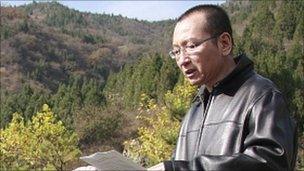Nobel Peace Prize awarded to China dissident Liu Xiaobo
- Published

Liu Xiaobo: Jailed for 11 years in December 2009
Jailed Chinese dissident Liu Xiaobo has been named the winner of the 2010 Nobel Peace Prize.
Making the announcement in Oslo, the head of the Norwegian Nobel committee said Mr Liu was "the foremost symbol" of the human rights struggle in China.
Several countries including the US, France and Germany, called for his immediate release.
China said the award could damage ties with Norway, and summoned the country's ambassador in Beijing in protest.
Norwegian Nobel Committee chairman Thorbjoern Jagland admitted he knew the choice would be controversial.
He told local television before the announcement: "You'll understand when you hear the name."
'Curtailed freedom'
Mr Jagland, reading the citation, said China's new status in the world "must entail increased responsibility".
"China is in breach of several international agreements to which it is a signatory, as well as of its own provisions concerning political rights."
Mr Jagland said that, in practice, freedoms enshrined in China's constitution had "proved to be distinctly curtailed for China's citizens".
He said the choice of Mr Liu had become clear early in the selection process.
Mr Liu, 54, was a key leader in the Tiananmen Square protests in 1989.
Last year he received an 11-year sentence for "inciting subversion" after drafting Charter 08 - which called for multi-party democracy and respect for human rights in China.
The Nobel Foundation, external citation read: "Liu has consistently maintained that the sentence violates both China's own constitution and fundamental human rights."
It praised Mr Liu for his "long and non-violent struggle" and highlighted its belief in a "close connection between human rights and peace".
Ending the citation, Mr Jagland said: "The campaign to establish universal human rights in China is being waged by many Chinese, both in China itself and abroad.
"Through the severe punishment meted out to him, Liu has become the foremost symbol of this wide-ranging struggle for human rights in China."
Liu Xiaobo's wife talks to the BBC about visiting her husband
Beijing quickly condemned the award, saying it could damage China-Norway relations.
Foreign ministry spokesman Ma Zhaoxu said: "Liu Xiaobo is a criminal who violated Chinese law. It's a complete violation of the principles of the prize and an insult to the peace prize itself for the Nobel committee to award the prize to such a person."
Later Norway said its ambassador in Beijing had been summoned to the Chinese foreign ministry.
"They wanted to officially share their... disagreement and their protest," a Norwegian spokeswoman said.
"We emphasised that this is an independent committee and the need to continue good bilateral relations," she added.
Unlike other Nobel prizes, which are administered in Sweden, the peace prize is awarded in Oslo by a committee appointed by the Norwegian parliament.
Norwegian Prime Minister Jens Stoltenberg said it would be "negative for China's reputation in the world" if it chose to punish his country over the award.
Mr Liu's wife, Liu Xia, said she was "so excited" by the award.
She told AFP news agency: "I want to thank everyone for supporting Liu Xiaobo. I strongly ask that the Chinese government release Liu."
Mrs Liu said police had informed her they would take her to Mr Liu's prison in the north-eastern province of Liaoning on Saturday so she could give him the news.
The prize is worth 10 million Swedish crowns ($1.5m; £944,000) and will be awarded in Oslo on 10 December.
US President Barack Obama said Mr Liu had "has sacrificed his freedom for his beliefs" and called for his speedy release.
German government spokesman Steffen Seibert said China should free him so he could attend the ceremony.
France's Foreign Minister Bernard Kouchner also welcomed the award and also called on China to release Mr Liu.
Thorbjoern Jagland, the Norwegian Nobel Committee chairman, made the announcement in Oslo
UN human rights commissioner Navi Pillay said the prize recognised a "very prominent human rights defender".
The London-based rights group Amnesty International said Mr Liu was a "worthy winner".
But Catherine Baber, Amnesty's deputy Asia-Pacific director, added: "This award can only make a real difference if it prompts more international pressure on China to release Liu, along with the numerous other prisoners of conscience languishing in Chinese jails."
No candidates are announced ahead of the peace prize but others mentioned in the media included Afghan women's rights activist Sima Samar, Russian human rights activist Svetlana Gannushkina, former German chancellor Helmut Kohl and Zimbabwean Prime Minister Morgan Tsvangirai.
The Nobel committee had to defend last year's controversial peace prize choice of US President Barack Obama.
- Published8 October 2010
- Published9 December 2010
- Published8 October 2010
- Published8 October 2010
- Published8 October 2010